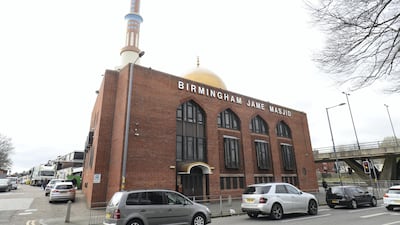British Muslims are to witness increased police presence around mosques and gain more funding to secure places of worship over the Islamic holy month of Ramadan after high profile attacks prompted a review of the threat.
Home Secretary Sajid Javid announced the roll out of a new £5 million fund would help places of worship gain security training and share best practice to protect their worshippers.
“There can be no doubt that people have been targeted because of their religion in terrorist attacks around the world, but also in vile hate crimes on the streets of this country – sledgehammer attacks on mosques, a Christian preacher spat at in the street, and a brick thrown through the glass door of a synagogue,” Mr Javid said.
“I condemn all these attacks with every fibre of my being. “
Monitor Tell Mama recorded a 593 per cent rise in reports of Islamophobia in the UK in the week following the Christchurch terror attack which killed 49 Muslims during Friday prayers in March. Mosques in the British city of Birmingham have reported recent incidents of damage with a sledgehammer and spray paint.
As much of the new funding will not be released until after Ramadan, when traditionally mosques are busy and vulnerable to greater threat, Mr Javid promised “increased activity” of police.
Muslim communities have been taking their own action to prepare for the increased risk of attack over the holy period.
“The mosques in Ramadan are very busy,” says Shaukat Warraich, CEO of Fatih Associates.
“Mosques are generally open in Ramadan 24 hours a day, which is a high risk situation when the far-right are openly saying ‘we should be targeting mosques’" says Shaukat Warraich, CEO of Faith Associates.
The group has been working closely with the Community Security Trust (CST), an organisation with a focus on the Jewish community, to help formulate security measures and train volunteers.
"CST has assisted other faith communities with advice and support regarding security at their places of worship for many years, based on our long experience protecting the UK Jewish community from antisemitism and terrorism," a spokesperson from CST told The National.
"The demand for this help has increased significantly since the recent terrorist attacks in New Zealand and Sri Lanka, and we are working with partners in other faith communities to assist where we can.”
Mr Warraich has been on a roadshow around the UK hosting mosque leaders and organisers on how to keep their congregations safe during the holy month.
He says a “cultural shift” is needed in British Muslim communities when it comes to protecting themselves, saying they are beginning to recognise that despite the government’s willingness to help, it “hasn’t got a bottomless pit of money”.
"Before you had the situation where everyone is welcome, doors are open, no checking, just come and use the facility," he told The National.
“Now what we're advising is yes, be open, but be more vigilant. Look at your CCTV, think about what protective measures you have in place and instead of investing in a brand new chandelier or a swanky new speaker system, why don't you reinvest that into some protective security?”
Mike Bluestone, director of security service provider Corps Security, says measures don’t have to cost the earth to be effective. In fact, trained volunteers can buy crucial time in the event of an attack if security personnel cannot be funded.
"We're not talking here about people playing 007 or Rambo, we're talking about people on the doors, just welcoming guests, welcoming arrivals. They know the faces, they know who to let in.”
Using people who are already familiar to congregants to play a lookout role retains the open atmosphere while providing a level of protection, he says, and other measures such as panic buttons, CCTV monitoring, suitable doors and clear procedures can assist not only in saving lives in the event of attack, but identifying individuals on reconnaissance missions.
"Mosques, synagogues, churches and temples all require security policies and simple to understand security operations procedures for the benefit of that community," he told The National.
“In some cases they're more sophisticated and may be drafted in a way that you'd find in corporate offices, in smaller communities, they might just be a list of do's and don'ts.”
What’s important, Mr Bluestone says, is vigilance and involving the community – for instance members of the congregation who are doctors or nurses – in contingency plans.
“Unarmed civilians cannot stop armed attackers... but they can be spotted, perhaps further away from the place of worship than might be expected. That gives people a bit of time because what effective security is about, and it's not just for holy places, this applies to offices or industry or wherever is your creating barriers along the way.
The more you can delay the attacker, the more time you give to the authorities, the armed police response and provide the support that's needed and that kind of threat."
There may not be a “bottomless pit”, but funding for security for places of worship has been increased in the wake of the Christchurch attack, in which a gunman killed 49 people at two New Zealand mosques.
The fund will make £1.6m available to places of worship from July. Since the scheme launched in 2016, more than £1.5 million has been awarded to 63 churches, 49 mosques, five Hindu temples and 16 gurdwaras. In order to qualify for the scheme, places of worship must be evaluated by a Police Counter Terrorism Security Advisor (CTSA) or Police Designing Out Crime Officer, who will then make recommendations on appropriate safety measures.
Mr Warraich says places of worship getting their hands on this funding used to be a cumbersome process, but is set to more streamlined in July’s round.
Mr Javid’s new £5m cash injection is designed to complement the Places of Worship fund by assisting in training alongside hardware provision.


